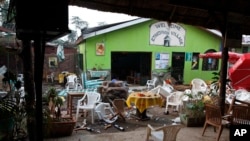Soccer fans around the world will be watching Saturday as England plays Belgium for third place in the World Cup, and on Sunday when France battles Croatia for the title.
In Uganda, police and many fans will check for security measures before entering any venue screening the action. The memory of attacks that killed scores of fans watching the 2010 final match remains strong.
Bridget Nakasi is among the Ugandans who remember the Kampala bombings on July 11, 2010.
“There is a fear deep inside for crowded places, like for example, to go for a football match where there are thousands of people going to a stadium. I am not very comfortable with that,” she said.
The bombings, at two venues packed with fans to watch the match, killed 76 people. Hundreds more were injured.
Militants took credit
Al-Shabab militants from Somalia took credit for the attack, saying it was to punish Uganda for deploying its forces to Somalia.
Ugandan troops form the bulk of the African peacekeeping mission AMISOM, which has been in Somalia since 2007.
Eight people have been convicted and sentenced to prison in connection with the attack.
Kampala establishments that are planning to screen the matches are being urged by police to follow recommended security measures. Police want venues to restrict entry and search all bags of those entering those places.
“The criminals, especially terrorists, would want to remind us of their capacity to disrupt,” said Emilian Kayima, the Uganda police spokesperson.
“We need owners of these venues to be well prepared. There are those who have been agitating to have open venues where people will come in from whichever side. That’s very dangerous; we discourage that. We are encouraging closed venues where access control is well handled and well maintained,” Kayima said.
He said police will be out in force in order to protect fans.
“Our readiness is total. We shall have strategic deployment with visibility being a guarantee. Both motorized and foot patrols will be in place to respond to any incidents, real or suspected,” Kayima said.
‘Cannot forget’
Joshua Kwebiiha manages Club 400 in Bukoto, a Kampala suburb, which has hired private guards and police personnel to provide security.
“One [purpose] is to ensure that whomever enters the place must be checked thoroughly well. Secondly, to make sure that no one should enter this place armed, but mostly, to ensure that there is a stiff checkpoint,” Kwebiiha said. Bags will be checked thoroughly, and the security team also will check anyone who goes out of the club and then comes back in.
The Kyadondo Rugby Club was one of the locations hit in the 2010 attacks. Staff member Rita Kezaala says security has been heightened ahead of this year's final.
“We cannot forget that day just like that," she said. “We just need to protect each other; we need to be very careful.”




